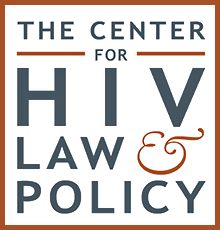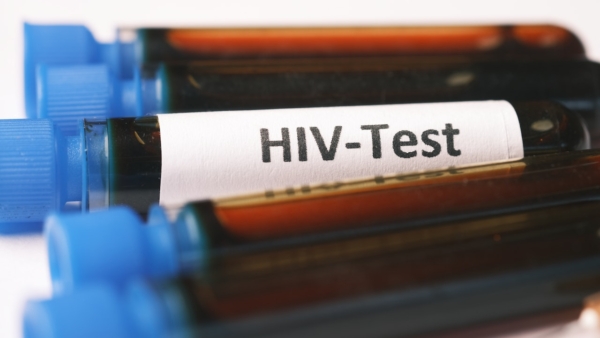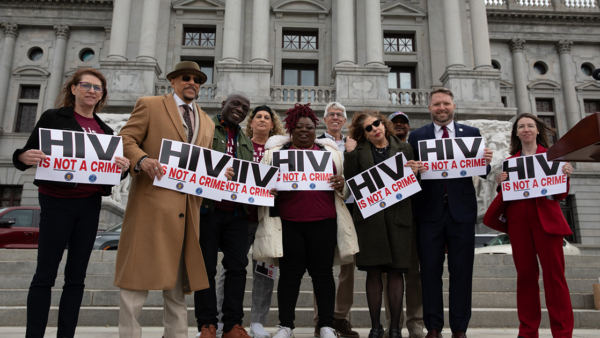Overview
Pennsylvania has a range of HIV-specific and general disease laws which are used to criminalise people living with HIV for perceived ‘exposure’. In addition, general criminal laws have been used to prosecute people living with HIV for non-disclosure of status prior to sex.
The only HIV-specific criminal provision in place relates to people living with HIV who engage in sex work. The law makes it an offence to be involved in a ‘house of prostitution’, ‘engage in sexual activity as a business’, or to ‘loiter in a public place for the purpose of being hired to engage in sexual activity’. The law explicitly makes it a felony to commit this offence while living with HIV, compared with a misdemeanour for people not living with HIV. Similarly, it is a felony to ‘promote prostitution’ if the person being ‘promoted’ is living with HIV, an offence which is a misdemeanour in most other circumstances, while paying for the services of a sex worker is also a third-degree felony when someone is living with HIV. The lack of definition of ‘sexual activity’ has led to people being prosecuted for acts which carry little to no risk of transmission, while disclosure and the use of condoms are not considered. In March 2024, State Senator Vincent Hughes and Representatives Benjamin Waxman and Malcolm Kenyatta introduced a bill that would repeal this provision. A further attempt was underway as of February 2025.
In November 2022, Governor Wolf signed into law a new bill which creates an additional felony offence against people living with communicable diseases, including HIV. HB 103 added a new section to the offence of ‘assault of a law enforcement officer’ which criminalises people who knowingly or intentionally cause, or attempt to cause, a law enforcement officer to come into contact with blood, semen, saliva, urine, or faeces by throwing, tossing, spitting, or expelling that fluid. This offence is ordinarily a third degree felony but the 2022 reform introduced an enhancement to second degree level (up to ten years’ imprisonment and a fine) if the person knew, or had reason to know, that the fluid contained a reportable communicable disease (which includes HIV). Although these methods of fluid ‘exposure’ include some which are not normally considered HIV transmission routes, the law does require that the disease in question be communicable by the ‘exposure’ method used, or attempted to be used, in order for someone to be found guilty, however it is not clear what threshold of likelihood is required to be proved, and whether this is assessed in general terms or specific to the circumstances of the case, including any transmission mitigations, such as viral suppression, present.
Another law criminalises ‘exposure’ to communicable diseases including HIV in incarceration. This provision, titled ‘assault by prisoner’, makes it an offence for an imprisoned person who is aware that they are living with a communicable disease to intentionally commit an ‘assault with a deadly weapon or instrument’ or cause ‘serious bodily injury’. This explicitly includes causing another to come into contact with bodily fluids by ‘throwing, tossing, spitting or expelling’ such fluid, knowing that the fluid was carrying a communicable disease. This offence is a second-degree felony punishable by an additional consecutive prison sentence of up to ten years, or for those already sentenced to life imprisonment or the death penalty, the equivalent penalty to second-degree murder. HB 103, passed in November 2022, added the same stipulation as the above offence to these offences, that the disease in question must be communicable by the method of ‘exposure’ used.
A number of general criminal provisions have also been used to prosecute people living with HIV outside of prisons and sex work. Non-disclosure of status has been criminalised through the leading case of Commonwealth v. Cordoba, in which a person living with HIV was charged with ‘reckless endangerment’ for having oral sex without disclosing his status. The Superior Court found that the non-disclosure rendered the sex non-consensual and amounted to reckless endangerment, which requires placing another at danger of death or serious bodily injury. The court reasoned that only a possibility of harm is required, regardless of likelihood, and it was irrelevant that in this case there was virtually no risk of transmission from the conduct.
Non-disclosure has also led to other charges. In a 1999 case, a man was charged with third-degree murder, attempted homicide and aggravated assault for having sex with five women without disclosing his status. All of the women later tested positive, but the man died before the case went to trial. People have also been convicted for aggravated assault for bleeding on, spitting, or biting others.
In another case, a person living with HIV was convicted of ‘communicating terrorist threats’ after he scratched a parole officer and referred to open cuts on his own hand. The court found that the likelihood of transmission was irrelevant, and all was required was the causing of terror itself.
In addition to these criminal charges, a number of provisions within the Pennsylvania health and administrative codes allow authorities to order medical examinations and quarantine for those suspected of living with communicable diseases.
It is difficult to establish how many cases there have been in Pennsylvania due to the use of general criminal provisions, however we are aware of at least 19 reported prosecutions.
As well as the successful move to strengthen the laws in 2022, there have been other attempts in recent years including two bills, 305 and 306, which were introduced in 2017 which sought to toughen laws concerning HIV in prisons, including strengthening ‘exposure’ laws and allowing disclosure of inmates’ HIV status to staff. The bills ultimately failed. Advocates have also sought to fight HIV criminalisation, raising awareness through an initiative in 2021.
For a detailed analysis of HIV criminalisation in Pennsylvania, as well as all other US states, see the Center for HIV Law and Policy report, HIV Criminalisation in the United States: a Sourcebook on State and Federal HIV Criminal Law and Practice.
Laws
Pennsylvania Statutes § 2702.1
Assault of law enforcement officer
(a) Assault of a law enforcement officer in the first degree
(…)
(2) except as provided under sections 2703 (relating to assault by prisoner), 2703.1 (relating to aggravated harassment by prisoner) and 2704 (relating to assault by life prisoner), a person is guilty of a felony of the third degree if the person intentionally or knowingly causes or attempts to cause a law enforcement officer, while in the performance of duty and with knowledge that the victim is a law enforcement officer, to come into contact with blood, seminal fluid, saliva, urine or feces by throwing, tossing, spitting or expelling the fluid or material.
(3) a person who commits an offense under paragraph (2) shall be guilty of a felony of the second degree if:
(i) the person knew, had reason to know, should have known or believed the fluid or material to have been obtained from an individual, including the person charged under this section, infected by a communicable disease (…); and
(ii) the communicable disease referenced in subparagraph (i) is communicable to the law enforcement officer by the method used or attempted to be used to cause the law enforcement officer to come into contact with the blood, seminal fluid, saliva, urine or feces.
Pennsylvania Statutes § 2703
Assault by prisoner
(a) Offense defined.–
(1) Except as provided under section 2704 (relating to assault by life prisoner), a person who is confined in or committed to any local or county detention facility, jail or prison or any State penal or correctional institution or other State penal or correctional facility located in this Commonwealth is guilty of a felony of the second degree if he, while so confined or committed or while undergoing transportation to or from such an institution or facility in or to which he was confined or committed intentionally or knowingly, commits an assault upon any of the following:
(i) Except as provided under subparagraph (ii), another with a deadly weapon or instrument, or by any means or force likely to produce serious bodily injury.
(ii) A detention facility or correctional facility employee with a deadly weapon or instrument, or by any means or force likely to produce bodily injury.
(2) A person is guilty of this offense if
(i) he intentionally or knowingly causes another to come into contact with blood, seminal fluid, saliva, urine or feces by throwing, tossing, spitting or expelling such fluid or material when, at the time of the offense, the person knew, had reason to know, should have known or believed such fluid or material to have been obtained from an individual, including the person charged under this section, infected by a communicable disease, including, but not limited to, human immunodeficiency virus (HIV) or hepatitis B (…)
(ii) the communicable disease referenced in subparagraph (i) is communicable to another by the method used or attempted to be used to cause another to come into contact with the blood, seminal fluids, saliva, urine, or feces.
[…]
Pennsylvania Statutes § 2704
Assault by life prisoner
Every person who has been sentenced to death or life imprisonment in any penal institution located in this Commonwealth, and whose sentence has not been commuted, who commits an aggravated assault with a deadly weapon or instrument upon another, or by any means of force likely to produce serious bodily injury, is guilty of a crime, the penalty for which shall be the same as the penalty for murder of the second degree. A person is guilty of this offense if:
(i) he intentionally or knowingly causes another to come into contact with blood, seminal fluid, saliva, urine or feces by throwing, tossing, spitting or expelling such fluid or material when, at the time of the offense, the person knew, had reason to know, should have known or believed such fluid or material to have been obtained from an individual, including the person charged under this section, infected by a communicable disease, including, but not limited to, human immunodeficiency virus (HIV) or hepatitis B (…)
(ii) the communicable disease referenced in subparagraph (i) is communicable to another by the method used or attempted to be used to cause another to come into contact with the blood, seminal fluids, saliva, urine, or feces.
Pennsylvania Statutes § 5902
Prostitution and related offenses
(a) Prostitution.–A person is guilty of prostitution if he or she:
(1) is an inmate of a house of prostitution or otherwise engages in sexual activity as a business; or
(2) loiters in or within view of any public place for the purpose of being hired to engage in sexual activity.
(a.1) Grading of offenses under subsection (a).–An offense under subsection (a) constitutes a:
(1) Misdemeanor of the third degree when the offense is a first or second offense.
(2) Misdemeanor of the second degree when the offense is a third offense.
(3) Misdemeanor of the first degree when the offense is a fourth or subsequent offense.
(4) Felony of the third degree if the person who committed the offense knew that he or she was human immunodeficiency virus (HIV) positive or manifesting acquired immune deficiency syndrome (AIDS).
Pennsylvania Statutes
§ 2702 Aggravated assault
A person is guilty of aggravated assault if he:
(1) attempts to cause serious bodily injury to another, or causes such injury intentionally, knowingly or recklessly under circumstances manifesting extreme indifference to the value of human life;
(…)
(4) attempts to cause or intentionally or knowingly causes bodily injury to another with a deadly weapon;
(…)
(b) Grading.–Aggravated assault under subsection (a)(1), (2) and (9) is a felony of the first degree. Aggravated assault under subsection (a)(3), (4), (5), (6), (7) and (8) is a felony of the second degree.
§ 2706 Terroristic threats
(a) Offense defined.–A person commits the crime of terroristic threats if the person communicates, either directly or indirectly, a threat to:
(1) commit any crime of violence with intent to terrorize another;
(…)
(d) Grading.–An offense under subsection (a) constitutes a misdemeanor of the first degree unless the threat causes the occupants of the building, place of assembly or facility of public transportation to be diverted from their normal or customary operations, in which case the offense constitutes a felony of the third degree.
§ 2705 Recklessly endangering another person
A person commits a misdemeanor of the second degree if he recklessly engages in conduct which places or may place another person in danger of death or serious bodily injury.
Further resources
Not all laws used to prosecute people living with HIV in this state are included on this page. For a comprehensive overview and analysis of HIV-related criminal and similar laws and policies, visit The Center for HIV Law and Policy
This report highlights the issue of HIV criminalization in Pennsylvania, where individuals living with HIV have been prosecuted under existing criminal laws solely due to their HIV status. The report emphasizes that following the evidence-based science and moving away from fear-based approaches will be essential in addressing HIV criminalization, ending stigma and discrimination, and ultimately halting the HIV epidemic.










